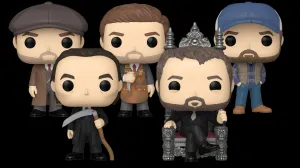We still have two months until the end of 2019, but some audiences are already thinking about the past year of television that has hit the airwaves. With the television world arguably being more saturated than ever, audiences have had no shortage of new and returning programs to check out — and according to a new report, the past year of shows have crossed a new milestone in LGBTQ representation. GLAAD, the world’s largest LGBTQ media advocacy organization, recently released its annual “Where We Are on TV” report, which outlines the statistics of diversity across network, cable, and streaming television from the past year. According to their report, the number of LGBTQ series regulars across broadcast television series is at an all-time high of 90, with those characters making up 10.2% of all series regulars. For the first time in the report’s history, there are also more LGBTQ women than men in regular and recurring roles on broadcast television.
Videos by ComicBook.com
The report highlights The CW’s programming, with LGBTQ characters making up 15.4% of all series regular characters on the network. In addition to LGBTQ representation on Legends of Tomorrow, Supergirl, and Black Lightning, the report mentions Batwoman “making history this fall with the first lesbian superhero title character, as out actress Ruby Rose picks up the cape of Kate Kane/ Batwoman.” It also highlights Supergirl‘s Nia Nal/Dreamer (Nicole Maines), who suited up earlier this year as television’s first transgender superhero.
“I mean, setting out to cast trans actors in trans roles is so important,” Maines told ComicBook.com earlier this year. “Now seeing Nia suited up as Dreamer has been like, ‘We did it.’ This is what we can do. It just makes it so much more meaningful and so much more like … I’ve seen so many folks on social media be like … It’s really weird. People are like, ‘Wow.’ People assume, without knowing me, they hired a cis actress to play a trans role. They’re like, ‘Well, this is great, but I wish they’d have hired a trans actress.’ Someone comes in and they’re like, ‘Um, they did.’ They’re like, ‘What?’ I’m like, ‘Hey kids.’”
“Being able to put your two cents in there. Being able to be political and to stick up for minority and marginalized people, while doing something that you love, while making entertainment, feels really, really great,” Maines added. “Being able to go to work every day and be like, ‘I am making a difference. I am adding to the conversation.’ That feels really good. When you’re having a bad day and you’re like, ‘You know, but this show means so much to so many people,” Then, seeing every time something happens on TV and how people react to it on social media. That’s like, ‘Wow, this is a tangible difference.’”
The report also cites ABC’s Stumptown, which is inspired by the comic book series of the same name, as another new series with a queer leading character. The series follows Dex (Cobie Smulders), a bisexual veteran and private investigator in Portland, Oregon. The report praises the show’s representation of Dex’s PTSD, which makes her “one of only a handful of LGBTQ characters with a disability on broadcast” television.
To read GLAAD’s full “Where We Are on TV” report, click here.








